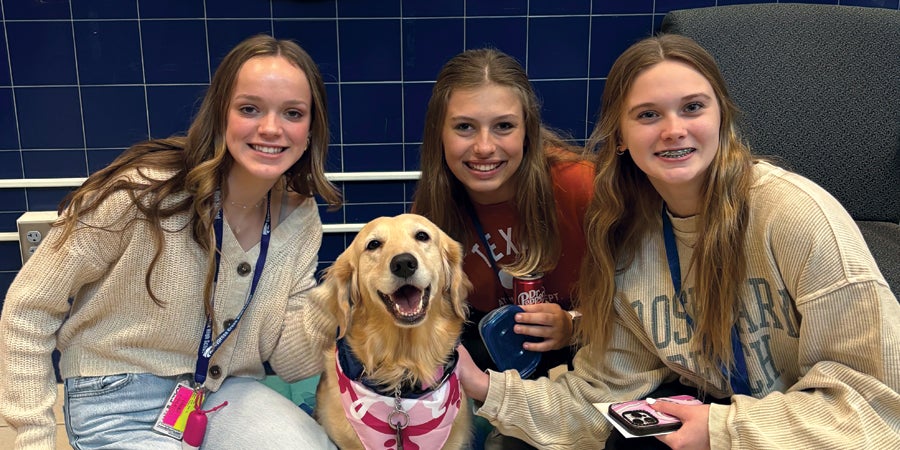Therapy Dogs Support Students and Staff
As she walks the halls at Cypress Creek High School, colleagues notice how calm, cheerful, and relaxed CeCe is when she connects with students. As anyone who works in a school knows, some days are ruff. But CeCe does whatever the job requires, whether sitting quietly as students talk, making classroom visits, or even rolling over for a belly rub.
A five-year-old golden retriever, CeCe is one of four comfort dogs that serve students at Cypress-Fairbanks ISD, located about 30 miles northwest of Houston. She’s a true professional, trained as a comfort dog to support students and staff.
“She loves her kids,” said Tammy Maaz, a coordinating counselor at Cypress Creek High School and one of CeCe’s handlers. “When I take her out into the hallways in between passing periods, she will literally just lay down in the middle of the hallway and the kids, as soon as they see her, they light up. Their moods change and they all stop. They have to say ‘hi’ and they have to love on her.”
Paw-sitive Support
The district “onboarded” its first comfort dog, Skye, in 2021 after it formed a mental health intervention team, which was charged with using different initiatives to support students who struggle mentally and emotionally, said Franklin Sampson, director of guidance and counseling at Cypress-Fairbanks ISD. The district then added three additional dogs, including CeCe.
The district’s comfort dogs received 18 months of training and are trained as AKC (American Kennel Club) certified comfort dogs. Their handlers also went through training to learn commands and to use the dogs effectively, Maaz said, adding she is an AKC certified comfort dog handler. The district worked with Interquest C.A.R.E.S., which provided the dogs and training and does ongoing support as needed.
When the district decided to use the comfort dogs on campuses, it wanted the dogs to be present in the counselors’ offices when they were meeting with a student in crisis, as well as to have the dogs walking the halls, providing students with a reward, Sampson said.
“She’s an absolute asset to us,” Maaz said of CeCe, adding that when students are experiencing challenges, CeCe is there for them. The results are often immediate — students are able to relax and gain emotional regulation, allowing them to calm themselves.
“She really just works wonders one on one with the kids,” Maaz said.
Going to the Dogs
Comfort dogs and social-emotional wellness dogs are making their way into more districts across Texas. Another district using these special dogs to support students and staff is Lancaster ISD, located about 15 miles south of Dallas.
Returning to school full time after the pandemic, counselors saw greater numbers of students dealing with high levels of depression and anxiety, said Meca Anderson, social emotional district counselor at Lancaster ISD.
“Students found it hard to be on campus and to stay on campus,” she said. “Everyone was dealing with a loss.”
Sampson and Maaz both noted that there was a change in student behavior post-pandemic that necessitated different interventions.
Lancaster ISD started its program in December 2023 with its first dog Angel, a French bulldog. It has since added two additional dogs, Bayou and Blue. Having the dogs has been a game changer for students and staff, she said.
“The staff say, ‘I can now come to work knowing the service animal is going to be here and I have that support,’” Anderson said. “It’s a heavy lift every day with the challenges that come. It softens the load that they have.”
The district’s principals reach out to request campus visits from the dogs, and each campus might have different needs and requests, Anderson said. The dogs may make visits to classrooms or just be present in the hallways.
“What’s happening in the world today and in the lives of students, there are so many unresolved issues and trauma that they’re exposed to in the home, and it comes to the school and impedes learning,” she said. “They don’t know how to handle the anger outbursts.”
The dogs help students with mind, body, and spirit, she said. A student who is emotionally dysregulated and has the dog there for support may find calm.
Maaz agreed, saying that in her district the dogs have been a tremendous help, in particular when the students work with counselors on plans to help them reduce anxiety, learn to cope, and not to spiral out of control. Part of their coping strategies are to visit with the comfort dogs.
“Because we all know that sometimes, just having an animal you can love on, you can kind of decompress and it immediately takes that [level] 10 to a five,” Maaz said. “I’ve seen that as I’ve worked with a lot of our students.”
And CeCe knows the difference between work and play. Once her special collar goes on, she’s in work mode, ready to support her humans. She doesn’t bark; she just listens and lets students love on her as needed, Maaz said.
“Students say this is their favorite ‘person’ on the campus,” she said. “They say the dog is the best thing that ever happened to the campus.”
At both districts, the dogs have specific handlers who receive training, and the dogs also live with district staff. When they aren’t working, they are living the lucky dog life.
Sampson said that Cypress-Fairbanks ISD did research and planning before bringing the dogs on campus, trying to think of every scenario that might happen during the dogs’ onboarding. For districts that are considering bringing comfort dogs to their schools, he said the program should be well thought out and have guidelines in place that drive the mental health support initiative.
Maaz and Sampson agree that the benefits of the comfort dogs for students and staff outweigh any challenges.
“They are just remarkable animals,” Maaz said. “And given the chance, they can do great things in healing and regulating peoples’ emotions.”
Photo: At Cypress Creek High School, CeCe and some students pose for a photo as they celebrate the comfort dog’s fifth birthday in November 2023.
Mary Ann Lopez
Mary Ann Lopez is a senior communications specialist for TASB.





